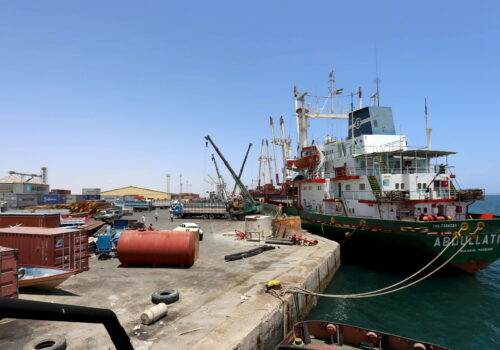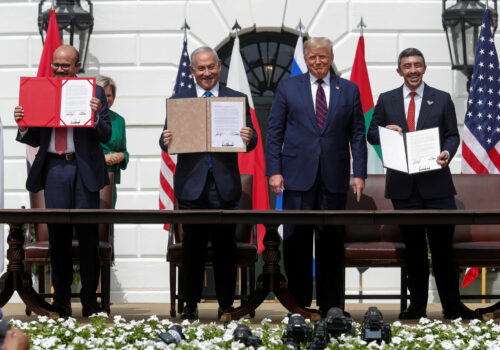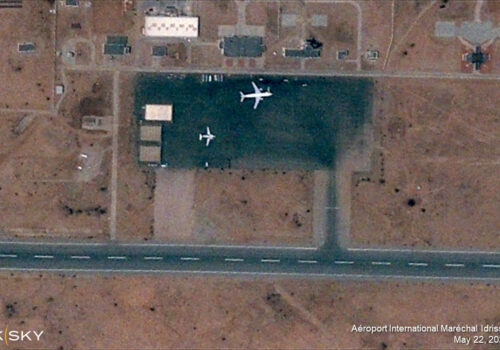As the conflict in Sudan rages on, reports have emerged that the commander of the Sudanese Armed Forces (SAF), General Abdel Fattah al-Burhan, is seeking to finalize normalization with Israel in exchange for political and military support.
Recently, such reports resurfaced when Israeli media outlets reported that Burhan’s special envoy visited Israel in April. According to these outlets, the envoy allegedly explained that the SAF had turned to Iran for military assistance only after failing to secure Israeli backing, and that Burhan was ready to fulfill any conditions set by Israel to expedite the completion of the agreement, although an SAF spokesperson denied such reports.
Given that the security rationale for finalizing normalization remains compelling, it is possible that Israel may still consider pursuing relations with the SAF. There is no doubt that the normalization of relations between Sudan and Israel holds great promise—particularly in areas such as technology, education, security, and agriculture. But for this promise to be realized, normalization must occur under a legitimate, civilian government and in a time of peace—not during war and authoritarian rule.
On October 23, 2020, Sudan and Israel announced their intention to normalize relations in a video call that included US President Donald Trump, then serving his first term, and Sudanese Prime Minister Abdalla Hamdok. Then, on January 13, 2021, I (serving as the Sudanese minister of justice at the time) signed the Abraham Accords on behalf of Sudan. Within months, Sudan repealed the long-standing Israel boycott law that had been in force since 1958.
The official signing of the full normalization agreement was supposed to take place in Washington, DC, in November 2021. However, a military coup led by Burhan on October 25, 2021, derailed this significant step. The outbreak of war on April 15, 2023—waged between the SAF, led by Burhan, and the Rapid Support Forces (RSF), led by General Mohamed Hamdan Dagalo (known as “Hemedti”)—upended normalization efforts and extinguished the hope of returning to a civilian-led democratic transition.
Israel may indeed be tempted by immediate security considerations to engage with the de facto authorities in Port Sudan. Yet, doing so would be a grave strategic miscalculation.
Security is a fundamental responsibility of any state. It is entirely reasonable for Israel and any other state, for that matter, to prioritize security in its foreign relations. However, security must be understood and prioritized in broad and strategic, not tactical, terms. A short-sighted alliance with Sudan’s military regime—currently unconstitutional, illegitimate, and destabilizing—would not promote true security for Israel, Sudan, or the region.
Normalizing relations with Sudan’s military elite, who publicly glorify war and vow to fight for another one hundred years, poses a direct threat to Sudan’s unity, Israel’s security, and the region’s stability. The SAF’s alignment with self-proclaimed jihadist forces, such as the Al-Bara ibn Malik brigade forces, and its growing ties with Iran signal the return of a dangerous and destabilizing political order. As stated in a report by the Sudan Peace Tracker, this alignment is deeply troubling; the SAF is providing them with official backing, military infrastructure, and battlefield coordination. This partnership has not only legitimized this and other extremist groups within the SAF’s structures but also enabled their rapid expansion and radicalization efforts under the cover of popular resistance—transforming these groups from tactical proxies into powerful actors, posing a long-term threat to Sudan’s stability and the wider region.
SAF’s rapprochement with Iran has enabled the latter to reestablish a strategic military foothold in Sudan—with tunnel networks, advanced weaponry, and strengthened ties with Islamist factions within the army. Iran has undertaken this as part of a broader effort to leverage Sudan’s instability to threaten Israel, counter US influence, and expand its regional power projection.
While some view the SAF’s outreach to Iran as an act of desperation, the relationship is, in point of fact, rooted in shared ideological foundations: anti-democracy, anti-West, and anti-Israel. Like Iran’s regime, the SAF targets activists advocating for democracy and civilian rule. Such voices have been arrested and tortured by the security agencies in the areas they control. The SAF and Islamists are ideologically against the West for reasons including that the West supports pro-democracy organizations. They are also inherently against Israel, especially considering suspicions that the 2009 and 2012 attacks on Sudan are believed to have been carried out by Israel, with the aim of preventing Iranian arms from being transferred to Hamas along what has been called a deeply entrenched arms corridor. Reiterating a well-known Islamist rhetoric, the SAF assistant commander-in-chief earlier this year blamed “powerful actors in the region” for the war in Sudan, claiming the war and destruction of Sudan is part of a strategy to permanently secure the state of Israel.
SIGN UP FOR THIS WEEK IN THE MIDEAST NEWSLETTER
The SAF has given too much power to Sudan’s Islamist movement and is aligned with the former ruling National Congress Party. The same network once hosted Osama bin Laden and built strong ties with Tehran. Iran’s provision of drones, military training, and intelligence support is part of a broader effort to reassert influence in the Red Sea region through ideologically aligned proxies; Sudan’s geostrategic location makes this alignment all the more dangerous.
Finally, the current de facto authorities have reversed the progress made by Sudan’s transitional civilian government in dismantling former Sudanese leader Omar al-Bashir’s Islamist regime. The transitional government had worked to remove party loyalists who were appointed illegitimately or illegally and repeal policies of “empowerment” that Bashir’s former regime had utilized to control the bureaucratic and military institutions of the state. However, the current de facto authorities have reinstated most elements of Bashir’s regime and are, therefore, reviving the very order that once endangered regional and international security. For example, in July, the newly SAF-appointed de facto Prime Minister Kamil Idriss appointed Lemia Abdel Ghaffar as minister of cabinet affairs. She is an Islamist whom Hamdok had previously dismissed from her post as secretary-general of the National Population Council. Idriss also appointed Abdullah Darf, one of Bashir’s lawyers and an Islamist who had held numerous state and local posts during Bashir’s era, as minister of justice.
Backing the SAF would not bolster a stabilizing partner; it would empower a military institution that has incorporated extremist groups intent on reviving an Islamist-authoritarian regime. History offers clear warnings that tactical cooperation with Islamist forces has consistently backfired, from Afghanistan to the Sahel. Port Sudan could—and likely would—exploit normalization to gain military and political leverage while continuing to oppose civilian governance and harbor animosity towards Israel.
Additionally, Sudan’s history has shown that sustainable peace and stability are impossible without democratic governance. Its complex political, ethnic, and cultural diversity cannot be managed through authoritarian rule. The current Port Sudan military regime is deeply unpopular among the vast majority of Sudan’s pro-democracy and pro-peace organizations and groups. Pro-democracy civilian opposition remains strong and determined. The establishment and continuation of autocratic or authoritarian rule will only deepen instability and create space for extremist actors to operate.
Israel should align itself with Sudan’s genuine pro-democracy civilian forces—not its military elites. These civilian actors represent the future of a stable, inclusive Sudan and do not pose a threat to Israel or the region. On the contrary, a democratic Sudan would be a true partner for peace, cooperation, and development.
The signing of the Abraham Accords between Sudan and Israel was historic and reflective of a regional movement toward peace and cooperation. Both countries stand to benefit immensely from a genuine partnership grounded in legitimacy and mutual respect.
If Israel is truly committed to long-term security and regional stability, it must unequivocally support peace and democratic governance in Sudan. Doing so will not only help Israel avoid the perception of propping up a military dictatorship but also prevent strategic misalignment with actors who view normalization as a means to gain power, while remaining ideologically opposed to Israel and civilian rule.
Sudan and Israel have much to gain from normalized relations, both economically, diplomatically, and strategically. But normalization must be rooted in legitimacy, not desperation; in peace, not war; and shared democratic values, not transactional opportunism. The road to genuine and enduring normalization and full diplomatic relations between Sudan and Israel runs through Sudan’s democratic forces—not the Islamist, anti-democratic generals entrenched in Port Sudan or elsewhere in the country.
Nasredeen Abdulbari is a nonresident senior fellow with the Atlantic Council’s N7 Initiative and formerly served as Sudan’s minister of justice during the transitional government. He signed the Abraham Accords on behalf of Sudan.
Further reading
Thu, Jul 31, 2025
Gateways to the Red Sea: The case for Israel–Somaliland normalization
MENASource By
Expanding the Abraham Accords to Somaliland could quietly anchor a more stable and cooperative Red Sea region.
Thu, Jul 17, 2025
Five years on, the Abraham Accords need a multilateral mission
MENASource By
As the Trump administration pushes for “commerce, not chaos” in the region, the Abraham Accords ideology is the most powerful tool to achieve that goal.
Tue, Dec 17, 2024
Sudan is caught in a web of external interference. So why is an international response still lacking?
MENASource By Emadeddin Badi
Sudan needs a unified international strategy, combining economic, political, and diplomatic pressure.
Image: Sudan's sovereign council head General Abdel Fattah al-Burhan meets Israeli foreign minister Eli Cohen in Khartoum, Sudan February 2, 2023. Sudan Sovereignty Council Press Office/Handout via REUTERS THIS IMAGE HAS BEEN SUPPLIED BY A THIRD PARTY. MANDATORY CREDIT



